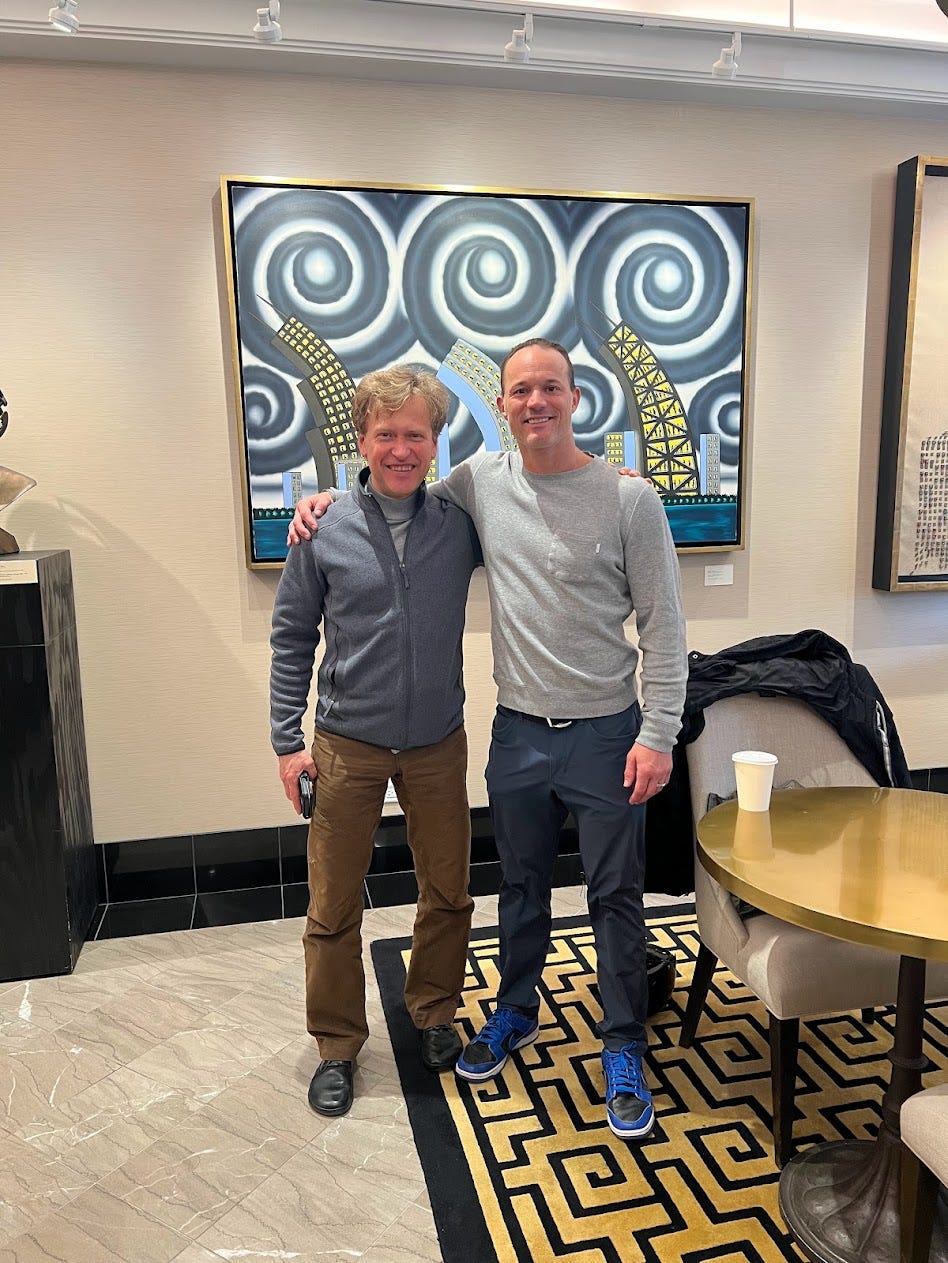🔥Welcome to Volume #00115!🔥
I’m Christian Champ. This is ☯️The Middle Way Newsletter ☯️. It is a place where I write, explore, share, and invite you along for the journey.
If you enjoy the newsletter, please share it with your friends.
🧘The Power of Daily Practice: How Our Practices Transform Our Lives🧘
“Why must I do a 30-day challenge?” asked my eight-year-old son.
I didn’t have an immediate answer beyond saying they are awesome, and if you finish it, I told you I’d get you some Posco markers. Yes, it included some incentives to get him excited to do it.
The main reason is that I wanted him to see the power of doing something every day and how much we can improve in 30 days.
I wanted him to see the power of practice in action. I wanted him to understand why we want to have practices.
His daily challenge routine included skateboarding on the ramps in our garage, reading, wrestling around the world (his head is on the ground, running his legs around it in a circle), and at least one landed kip-up.
Every day, he needed to complete all four tasks—not one, not three, but all four—before hitting his head on the pillow.
Our life is the meta-practice. The daily practices are the micro that drive what becomes our life. They are the chapters that make up our story. They create the current and future us.
Practices cultivate our lives by bringing six things to the table:
1. Intention
When intentional about our practices, we focus more and get more out of them. We realize when a practice continues to serve us and when we need to switch it up. We become more accountable for the habits and routines that dominate our daily lives.
2. Noticing
When we practice, we look for feedback and see the world differently. We notice what our actions are creating and what affordances show up. I recently bought a new car and now I’m constantly noticing cars. It is the same as our practices. We actively choose what we want to be aware of and what we want to see more of.
3. Discernment
When we practice for a time, we refine our views, develop the ability to judge what is working and develop a taste for understanding quality. Our discernment takes us to new levels and opens up new possibilities. Practice enhances discernment.
4. Outsourcing
We outsource what we need to think about and what we need to do, which opens up space for the new. Because of this space, we create and grow. We go to new frontiers and find new possibilities.
5. Releasing Tension
When something is a practice, we let go of the need to be perfect. We allow ourselves to find more flow and relax on self-judgment. When we release tension, we can use that energy to attain new heights.
6. Legibility
The more we practice something, the more we can see. Details show up, and we go from not knowing what we don’t know to knowing what we don’t know to knowing it.
Think of any skill we learned. We knew none of the steps, but then they became apparent. New spaces formed, making each move legible.
It is like the idea that discipline creates freedom. The more we do something, the more legible the steps become, and the more we can remix, color outside the lines, and play a different song. First, we must learn the original song and see the original lines before transforming them.
My son is over three months into his “30-day challenge” and is still going strong. Reading is now a daily habit. He can hit a kip-up 75% of the time he attempts it (up from around 15%) and do multiple kip-ups in a row. The same goes for his around the world and leveling up his skate tricks.
Questions we can ask ourselves around practice include:
What am I practicing?
What am I trying to make permanent in my life right now?
What do I want to get better at?
Everything starts with practice.
🧠Things to Think About🧠
Roger Federer Commencement Address
Federer delivers a masterful commencement address to Dartmount.
My favorite parts:
Effortless is a myth
The truth is, I had to work very hard... to make it look easy.
I spent years whining... swearing… throwing my racket… before I learned to keep my cool.
The wakeup call came early in my career, when an opponent at the Italian Open publicly questioned my mental discipline. He said, “Roger will be the favorite for the first two hours, and then I’ll be the favorite after that.”
I was puzzled at first. But eventually, I realized what he was trying to say. Everybody can play well the first two hours. You’re fit, you’re fast, you’re clear... and after two hours, your legs get wobbly, your mind starts wandering, and your discipline starts to fade.
Talent takes work
Yes, talent matters. I’m not going to stand here and tell you it doesn’t.
But talent has a broad definition.
Most of the time, it’s not about having a gift. It’s about having grit.
In tennis, a great forehand with sick racquet head speed can be called a talent.
But in tennis... like in life... discipline is also a talent. And so is patience.
Trusting yourself is a talent. Embracing the process, loving the process, is a talent.
Managing your life, managing yourself... these can be talents, too.
Some people are born with them. Everybody has to work at them.
It’s only a point
In tennis, perfection is impossible... In the 1,526 singles matches I played in my career, I won almost 80% of those matches... Now, I have a question for all of you... what percentage of the POINTS do you think I won in those matches?
Only 54%.
In other words, even top-ranked tennis players win barely more than half of the points they play.
When you lose every second point, on average, you learn not to dwell on every shot.
You teach yourself to think: OK, I double-faulted. It’s only a point.
OK, I came to the net and I got passed again. It’s only a point.
Even a great shot, an overhead backhand smash that ends up on ESPN’s Top Ten Plays: that, too, is just a point.
We always need a team
Tennis... like life... is a team sport. Yes, you stand alone on your side of the net. But your success depends on your team. Your coaches, your teammates, even your rivals... all these influences help to make you who you are.
Trying Our Best and Not Being Disappointed
Alex Epstein writes about his “least favorite experiences short-term but most valuable experiences long-term is trying my best and not getting the results I want.”
Every time I work hard on new content I have a permanent source of new, improved material.
Every time I try new approaches I get info on what works and what doesn’t.
Every time I am dissatisfied with my performance I learn about areas I can improve, arguments I need more efficient responses to, and opposition tactics I need to anticipate next time.
Every time I am disappointed with an outcome that involves factors outside my control it’s an opportunity to get better at managing expectations.
Every time I am dissatisfied with a venue or host I learn about what terms to demand upfront and how to react if they are violated.
Every time I am dissatisfied with how I spent my time it’s an opportunity to think about priorities.
🎧Things to Listen, See, and Watch 🎧
💣Words of Wisdom💣
"I may not be able to change someone. I may not be able to change a circumstance. But I can change myself, how I respond, who I am being. That is where all the power resides." (Kamal Ravikant, Live Your Truth)
"Once something is, we can't work backward to change" (Margaret J. Wheatley, So Far From Home)
"The best way to get past any barrier is to come at it from a different direction, which is one reason it is useful to work with a teacher or coach." (Anders Ericsson, Robert Pool, Peak)
“While you cannot directly control an emotional state in another person, people are influenced by your emotional energy." (Julia DiGangi, Energy Rising)
There’s a time for certain ideas to arrive, and they find a way to express themselves through us." (Rick Rubin, The Creative Act)
“Every day is like a blank page: When you’re finished filling it, you can save it, you can crumple it up, or you can slide it into the recycling bin and let it be. Only time will tell you what it was worth." (Austin Kleon, Keep Going)
"Often we go through an entire conversation – or indeed an entire relationship – without ever realizing that each of us is paying attention to different things, that our views are based on different information." (Douglas Stone, Bruce Patton, Sheila Heen, Difficult Conversations)
"The answer to just about every question about work is really the question, “Who can you help?”" (Seth Godin, This Is Marketing)
"Our idea of happiness may itself be the main obstacle keeping us from true happiness." (Thich Nhat Hanh, No Mud, No Lotus)
"Religion, at its best, facilitates empathy, gratitude, and awe. Science, at its best, reveals true grandeur beyond our wildest dreams." (Sasha Sagan, For Small Creatures Such as We)
"We can be too quick to blurt out what we believe are the correct answers, when more value can be gained by searching for a better question. A questioning mentality is far more effective than a knowing mentality." (Laurence Endersen, Pebbles of Perception)
“The enemies of practice are pride and fear and self-satisfaction. To practice requires humility. It forces us to admit that we don't know everything. It forces us to submit to feedback from people who can teach us. But surely practice isn't a sign of weakness—after all, some of the people most famously disciplined about practice are Michael Jordan, Jerry Rice, Roger Federer, Mia Hamm, and Tiger Woods. To practice isn't to declare, I'm bad.
To practice is to declare, I can be better.” (Dan Heath)
🙏Thanks for Reading🙏
What practices do we need to lean into?
Namaste,
Christian
Finally met my buddy Dmitri in person in Chicago.
Special thanks to him for asking me when the next episode of The Middle Way is coming out!














Share this post